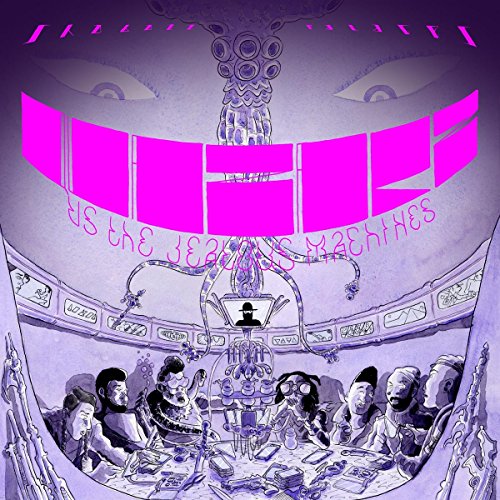
Shabazz Palaces
Quazarz vs. The Jealous Machines
Release Date: Jul 14, 2017
Genre(s): Rap
Record label: Sub Pop Records
Music Critic Score
How the Music Critic Score works
Buy Quazarz vs. The Jealous Machines from Amazon
Album Review: Quazarz vs. The Jealous Machines by Shabazz Palaces
Very Good, Based on 11 Critics
Based on rating 8.5/10
Shabazz Palaces' Ishmael Butler (aka Palaceer Lazaro) has always used fantasy and fiction to make salient observations about the real world we inhabit. As Butterfly from the '90s conscious rap group Digable Planets, he used psychedelic poetics to promote progressive values such as a woman's right to choose. As Butler matured and evolved as a lyricist over the past two decades, his work became less literal and more literary.
Based on rating 8/10
Three years to the month they released Lese Majesty, rapper Ishmael Butler, percussionist Tendai Maraire, and a small cast of associates returned with the follow-up and the follow-up's follow-up -- the third and fourth Shabazz Palaces albums. Produced by Butler and a new collaborator, veteran studio dweller Sunny Levine, Quazarz vs. The Jealous Machines was birthed first.
Based on rating 8/10
Israel Butler and Tendai Maraire, better known as *Shabazz Palaces, have always done things at their own pace, in their own style. Possessing the distinction of being Sub Pop's first hip-hop act, no one else really sounds like the former jazzists from Digable Planets. Right from their gorgeous full-length debut, 2011's Black Up the duo announced themselves as out of this universe aliens who understand the human condition more than anyone else with their starkly minimalist sound played through a hadron collider of echo.
Based on rating 4/5
I n years to come, when the career of the Seattle rap duo Shabazz Palaces is viewed through a historical lens, it may well be opined that these third and fourth albums were substantially more straightforward, even more commercial, than their predecessor, 2014's Lese Majesty. Said opinion would be correct, although it's worth noting that these two interlinking conceptual works about an alien called Quazarz ("a sentient being from somewhere else, an observer sent here to Amurderca to chronicle and explore as a musical emissary", explains the accompanying blurb) involve muffled, lo-fi instrumentals; tracks that sound like several entirely unconnected pieces of music spliced together; and at least one song on which the rapping appears to be in a different time signature to the backing track. Among a panoply of obscure special guests is the Shogun Shot, who raps with a pronounced lisp, and a man who calls himself Fly Guy Dai, a name that carries the suggestion, alas unfounded, that he might be from Aberystwyth.
Based on rating 7.6/10
Ishmael Butler's Shabazz Palaces project has always occupied another plane, his discordant sounds and bizarro abstract lyrics just close enough to the familiar to spur intense cognitive dissonance. The music Butler makes with Tendai Maraire is avant-garde but undeniably focused: free-jazz rap made with samplers, sequencers, and drum machines. Distinctly informed by blackness and the black experience, it nonetheless has defied any previously constructed conventions, an awkward fit for any box you might try to squeeze it into.
Based on rating 6.5/10
On their dusty space-rap debut, Black Up, and then on its abstract follow up Lese Majesty, Seattle hip-hop duo Shabazz Palaces established their output as belonging more to the art gallery than the streets. Led by the Palaceer Lazaro (also known as Ishmael Butler, who formerly was a member of jazz-rap group Digable Planets), the group takes its head-trip aesthetic down thoughtful and conceptual avenues. Their ambitious new two-album project, centered around an interstellar-traveler character called Quazarz, is their most fun and thematically rich work, though it still makes no concessions for those new to Shabazz Palaces' weirdness.
Based on rating 3/5
With their ambitious double-album release, Ishmael Butler and Tendai Maraire, better known as experimental hip hop voyagers Shabazz Palaces, have introduced us to a brand new persona: Quazarz, "a sentient being from somewhere else". On the companion to 'Quazarz vs. The Jealous Machines', 'Quazarz: Born On A Gangster Star', our protagonist lands on Earth (or "Drake world"), experiencing American life as it is today.
Based on rating 3/5
Nobody would accuse Shabazz Palaces of lacking ambition. Comprised of ex-Digable Planets rapper Ishmael Butler and multi-instrumentalist Tendai Maraire, the duo took a hatchet to established hip-hop tropes on previous long players Black Up and Lese Majesty. This follow-up consists of two simultaneously-released concept albums that recount a space fantasy so off-the-wall it would make George Clinton's head spin.
Based on rating 5/10
Ishmael Butler first became known as being the leader in Digable Planets, an early 1990s hip-hop group that scored a breakout hit with the jazz-tinged "Cool Like That". They followed that single with a well-regarded second album called Blowout Comb but failed to connect with the audience. After nearly 15 years in the wilderness, Butler returned with producer Tendai Maraire under the moniker Shabazz Palaces.
Opinion: Excellent
Shabazz Palaces aren't spring chickens, nor are they even technically a younger-generation act. The group's mastermind, Palaceer Lazaro--earth name: Ishmael Butler--was once, in a previous creative life, known as Butterfly from Digable Planets. But Shabazz's music circumvents genre convention with such unbridled imagination that it may as well represent the sound of youth culture clamoring at the gates for a changing of the guard.
Opinion: Average
As a big, big fan of Flying Lotus' band of genre-defying Brainfeeder pals, I've always felt Shabazz Palaces might be the most underhyped, with their Daft Punk-esque costumes and slower, intricately mixed and always forward-thinking beats, often getting swallowed up in the hype over Flylo, Kamasi Washington or Thundercat. This double release - what should have been their epic double feature - doesn't exactly help me prove my point. When I first told one of my friends SP were coming out with a twin, highly conceptual pair of records, he simply groaned.
'Quazarz vs. The Jealous Machines'
is available now

